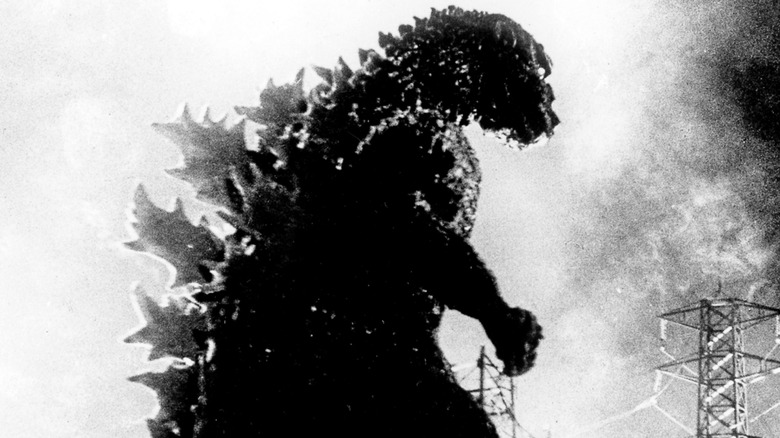Godzilla's Composer Risked 'Career Suicide' To Save The Film From Certain Doom
There are few genre films of any kind quite as respected as 1954's "Godzilla." Directed by Ishiro Honda, the film was an examination of post-World War II Japan, a nation that had experienced the horrors of the atomic bomb. The now-iconic monster was a narrative device used to reckon with those horrors, and even though some 70 years later the movie has secured its place in cinema history, it wasn't always a sure thing. So much so that composer Akira Ifukube was advised to back out of doing the project by his peers for fear that it would ruin his career.
In the 2019 book "LIFE Godzilla," it's explained that production company Toho was not confident in the film ahead of its release. "Godzilla" was a movie that could have ended a great many careers. "We couldn't reassure them," said assistant director Koji Kajita. "There was still no soundtrack and without it the film looked stupid." That's when Ifukube, who was a concert composer working on as many as ten films per year, stepped in to change the narrative. However, the prolific composer was warned that taking this job might be a form of career suicide. As he recalled in the book:
"Some friends in the industry warned me against it. Just as it was deemed career suicide for an actress to star in a ghost film, people said working on a monster film would end my career and advised me to back out. But I felt it was a serious film. I refused to listen and proceeded to work on it."
Still, in some ways, there wasn't all that much at risk given the broader cultural view of musicians in the country at that time. "Japanese musicians were thought to be 'less than a man,' much less composers, who were considered slightly insane to ordinary Japanese folk," Ifukube explained.
Budget constraints made the Godzilla soundtrack what it is
As the book explains, Ifukube had a personal connection to the underlying message in the film. He called himself a hibakusha, which loosely a survivor of the bomb who is affected by radiation, after suffering radiation poisoning during World War II. "Mr. Ifukube and I...shared very similar ideas about nuclear weapons," Honda said. Ifukube, for his part, saw the opportunity here that his peers seemingly could not:
"A monster representing nuclear war is not an abstraction but sheer fear, it's global. I couldn't sit still when I heard that in this movie the main character was a reptile that would be rampaging through the city!"
1954's film portrayed Godzilla as a true monster, long before he eventually became a hero of sorts. That direction informed Ifukube's legendary, brooding score that accompanies "Godzilla." Interestingly, the book reveals that budget constraints only allowed the composer to work with a small orchestra. This was a blessing in disguise, as the minimalist approach to the score is part of what makes it so memorable. The score ended up giving Honda confidence in the film's prospects:
"It made me think that we might have a successful picture after all. Mr. Ifukube's style was very classical ... but it was also very bold and direct. That's why we picked him."
The film was indeed a mammoth success that paved the way for a franchise that is still going strong to this day, and Ifukube's score continues to influence the music of modern films in the series. This includes 2023's heralded "Godzilla Minus One," which uses Ifukube's legendary Godzilla theme to great effect. Ifukube, for his part, went on to have a mammoth career well beyond the original "Godzilla." He amassed nearly 300 composer credits before his death in 2006, staying with this franchise up through 1995's "Godzilla vs. Destroyah." Doing this film was anything but career suicide — it became Ikufube's calling card.

